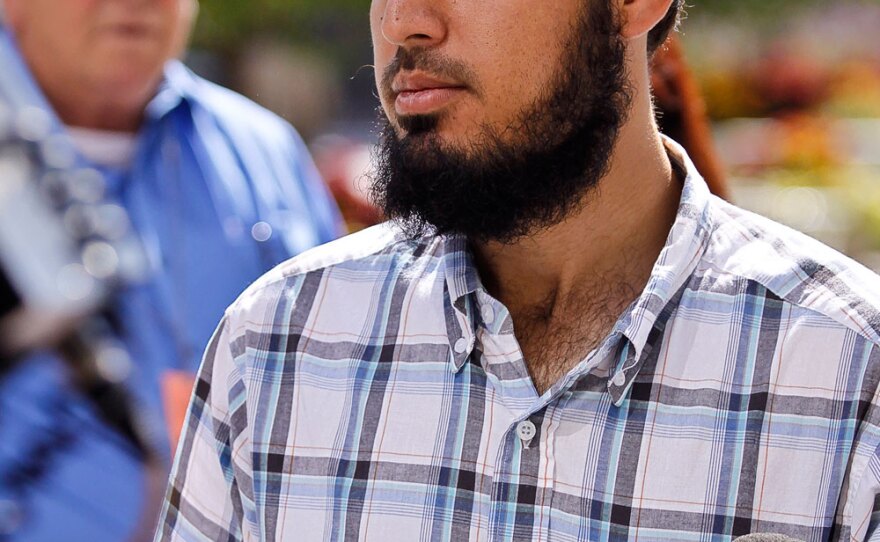President Obama met with FBI agents in New York on Tuesday to thank them for helping derail an alleged terrorist plot there.
The man at the center of the case, a Denver-area shuttle bus driver named Najibullah Zazi, was arrested last month and charged with conspiring to blow up targets in the U.S. Now he's in a Manhattan federal prison. He has pleaded not guilty.
The case has had members of the FBI's Joint Terrorism Task Force in both New York and Denver on round-the-clock duty for weeks.
For all the questions surrounding the alleged New York plot, the one thing prosecutors seem convinced of is that Zazi wasn't working alone. And yet, Zazi is the only suspect in the case behind bars. Both his father and a New York imam arrested for lying to federal authorities are currently out on bail.
The FBI has been fairly upfront about who the co-conspirators might be, and public statements leave little doubt others are involved. According to court documents, Zazi was not alone when he shopped for the chemicals he allegedly needed to put together explosives.
According to law enforcement officials, when Zazi began mixing the chemicals, he messaged others for advice. And, last year, when Zazi traveled to Pakistan allegedly to train with al-Qaida, authorities say he took other men with him.
"There are a lot of reasons why someone might not be arrested as soon as the evidence meets the threshold of probable cause which is sufficient to make an arrest," said Kenneth Wainstein, the former head of the Justice Department's national security division during the Bush administration. "Once you arrest somebody, that person is off the street and has dried up, basically, as an intelligence source for law enforcement."
As Wainstein sees it, the lack of additional arrests doesn't mean there's a lack of evidence. Instead, it is more likely to be a strategy aimed at making sure all the plotters are caught.
Sam Rascoff, who used to work on the intelligence squad at the New York Police Department, agrees.
"Part of what the government is doing is waiting and seeing who they might be in contact with, who they might be touching base with, who they might be receiving e-mails from and so on and so forth," he said.
No Timeline
Rascoff says right after the Sept. 11 terrorist attacks, law enforcement was all about arrests. Now, he says, the calculations are more nuanced. Officials aren't just thinking about prosecutions; they are thinking about intelligence-gathering.
Law enforcement officials close to the Zazi case tell NPR that's what is going on here.
Among the questions they still want to answer: Where are the explosives? Who else was involved? Was Zazi really in charge?
"The government may well have a robust case against these guys already but is looking to widen its understanding of this conspiracy and who might have taken part in it," said Rascoff.
At one point in the early days of the case, law enforcement officials told NPR they had more than a dozen people connected to Zazi under constant surveillance. The FBI has interviewed at least three people in New York extensively. Agents searched their apartments, too. One of them is a former high school friend of Zazi's named Adis Medunjanin. He is originally from Bosnia and is a naturalized citizen. He was a running back at Zazi's high school.
According to Medunjanin's attorney, Robert Gottlieb, the FBI interviewed him for 14 hours about the case. Gottlieb wouldn't characterize what his client talked to the FBI about, but he did say law enforcement clearly is interested in him.
"I know as a defense attorney, having done this for many years, that government, the FBI certainly suspects that he could have been involved," Gottlieb said. "That is not of course a substitute for proof. It is not a substitute for evidence."
Gottlieb says he told his client he should just assume he is under constant surveillance — and just because he hasn't been arrested yet, Gottlieb told him, it doesn't mean he won't be.
"Because an arrest has not been made," Gottlieb said, "I think it is unwise for anyone ever to conclude that because of a certain number of days that have passed therefore there is no longer any danger of an arrest."
Officials close to the case say they have no timeline for when the other arrests might happen. One law enforcement official put it this way: "We aren't in any rush."
Copyright 2022 NPR. To see more, visit https://www.npr.org. 9(MDAzMjM2NDYzMDEyMzc1Njk5NjAxNzY3OQ001))







